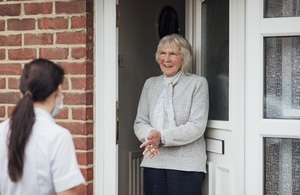February interim findings from COVID-19 REACT-1 study published
Report findings show infections in England have fallen significantly since the last report in January.

- Over 85,400 volunteers tested in England between 4 and 13 February 2021 as part of one of the largest COVID-19 studies
- Initial findings from Imperial College London and Ipsos MORI show infections fell by more than two-thirds from the last REACT report, with 1 in 196 people infected
- Infection levels remain high and it is critical everyone continues to follow the rules to help bring down infections even further and reduce pressure on the NHS
The interim findings from the ninth report of REACT-1, one of the country’s largest studies into COVID-19 infections in England, have been published today by Imperial College London and Ipsos MORI.
Over 85,400 volunteers were tested in England between 4 and 13 February to examine the levels of infection in the general population. The findings show infections in England have fallen significantly since the last report in January.
These latest findings demonstrate the impact lockdown restrictions are having on reducing infections across the country. Infections still remain high with more people in hospital than at the peak last April and hospital admissions for COVID-19 are at around 1,600 a day. It is vital everyone continues to play their part by staying at home and getting vaccinated when invited.
The main findings from the ninth REACT study show:
- national prevalence fell by two thirds from 1.57% to 0.51%, or 51 per 10,000 infected, compared to the last REACT report from 6 to 22 January
- a halving time of 15 days and an R number of 0.72, based on the prevalence observed at the end of the last report and today’s interim findings
- regional prevalence fell in all areas compared to the last REACT report from 6 to 22 January. It was highest in the North West (1.38% to 0.91%) and North East (1.22% to 0.82%).There were substantial falls in prevalence compared to the last report in January in London (2.83% to 0.54), West Midlands (1.66% to 0.33%), East of England (1.78% to 0.54%), South East (1.61% to 0.30%), East Midlands (1.16% to 0.51%). There was a smaller fall in Yorkshire and the Humber (0.80% to 0.61%)
- prevalence fell substantially across all age groups compared to the last REACT report from 6 to 22 January. Prevalence fell from 0.93% to 0.30% among the over-65s. Highest prevalence is among 18 to 24-year-olds at 0.89% and those aged 5 to 12 at 0.86%
- large household size, living in a deprived neighbourhood, and areas with higher numbers of Asian ethnicity individuals were associated with increased prevalence
- healthcare and care home workers were more likely to test positive compared to other workers
Health and Social Care Secretary Matt Hancock said:
These findings show encouraging signs infections are now heading in the right direction across the country, but we must not drop our guard.
Cases and hospital admissions remain high – over 20,000 COVID-19 patients are in hospital – so it is vital we all remain vigilant and follow the rules as our vaccination rollout continues at pace.
I urge everyone to continue to stay at home – remember hands, face, space – and get your jab when you receive your invite.
While the vaccine programme continues to expand to protect as many people as possible, with over 15 million people vaccinated, we do not yet know whether being vaccinated stops someone from passing the virus on to others. It will also be some time before the impact of the vaccination programme reduces pressures on hospitals.
It is critical everyone continues to follow the rules, stays at home, reduces contact with others and maintains social distancing – remembering hands, face, space.
Professor Paul Elliott, director of the programme at Imperial, said:
These encouraging results show that lockdown measures are effectively bringing infections down. It’s reassuring that the reduction in numbers of infections occurred in all ages and in most regions across the country. “While the trends we’ve observed are good news, we need to all work to keep infections down by sticking to the measures which are designed to protect us and our health system.”
Kelly Beaver, Managing Director, Public Affairs at Ipsos MORI, said:
The reduction in prevalence from our last REACT round is very welcome, particularly the very large reduction in London. But it’s important that we continue following all the measures that the government has set out so that we can continue to see further reductions, and make progress in beating the pandemic.
This report is the latest from the REACT study which was commissioned by DHSC and carried out by a world-class team of scientists, clinicians and researchers at Imperial College London, Imperial College Healthcare NHS Trust and Ipsos MORI.
Background information
Read more information on the Real-time Assessment of Community Transmission (REACT) programme of work
This study falls under pillar 4 of the COVID-19 National Testing Programme, which focuses on mass surveillance in the general population.
See the REACT-1 studies on GOV.UK.